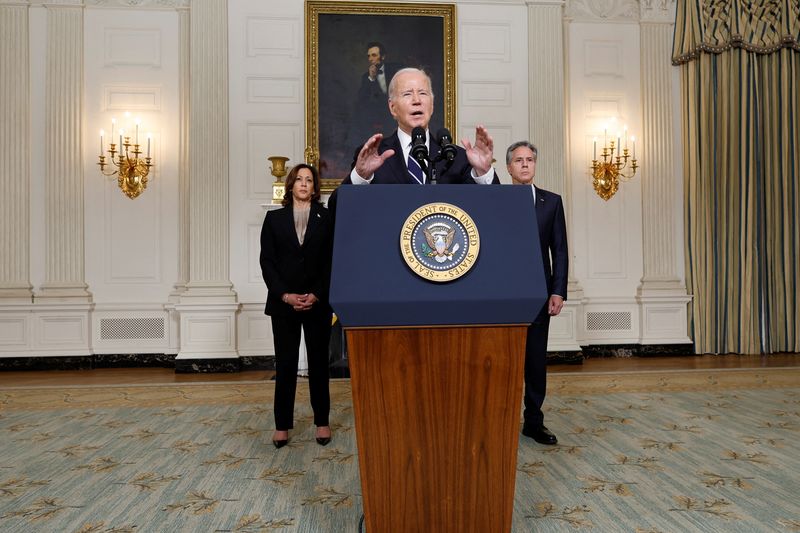By Patricia Zengerle
WASHINGTON (Reuters) - U.S. President Joe Biden pledged to bolster military support for Israel following an unprecedented attack by Hamas militants that has killed more than 1,000 Israelis and prompted an intense retaliation against the Palestinian-controlled Gaza Strip.
His promise raised questions about whether Washington can ramp up defense aid to Israel without jeopardizing aid for Ukraine, especially given Republican lawmakers' ouster of House of Representatives Speaker Kevin McCarthy and failure so far to name a replacement.
Biden administration officials insist Washington can absolutely do both, but acknowledge there will be challenges.
WHY DOES IT MATTER THAT THERE IS NO HOUSE SPEAKER?
The U.S. Congress controls spending, so Biden must convince the Senate and House to pass legislation authorizing additional funding. These spending bills generally originate in the House, where the Speaker - the elected leader of the majority party - controls what legislation is put to a vote.
Republicans hold a narrow 221-212 majority in the House, which made it possible for just a handful of their members to oust McCarthy last week, the first time in U.S. history this has happened.
Because McCarthy's ouster was unprecedented, it is not clear whether Representative Patrick McHenry, who is serving as temporary speaker, can legally call a vote on any aid legislation.
Further complicating the issue, many of the hard-right members who ousted McCarthy oppose aid to Ukraine, including Representative Jim Jordan, a frontrunner in the Speaker's race. House Republicans refused to include aid to Ukraine in a last-minute spending bill passed last month to avert a government shutdown.
Support for Israel is far stronger, with Republicans closely tied to conservative Israeli Prime Minister Benjamin Netanyahu, and the Biden administration is considering tying a request for assistance to Ukraine to more money for Israel.
HOW MUCH DO ISRAEL AND UKRAINE'S NEEDS OVERLAP?
Israel is a major long-term recipient of U.S. military assistance and enjoys a steady stream of U.S. aid. The two countries agreed in 2016 on a 10-year deal with $38 billion covering annual grants to buy military equipment and a $5 billion missile defense appropriation.
In the current phase of the conflict, Israel's major need is for small arms for its infantry and air defense interceptors to protect its civilian infrastructure and military command and control centers.
It is unlikely Israel has burned through its small arms ammunition this early in the conflict.
On the missile defense side, Israel uses the Iron Dome system, developed with U.S. backing to provide air defenses. Iron Dome is not designed to fire the same interceptor used by the U.S.-made Patriot system and other missile defense units deployed in Ukraine.
Ukraine's major needs are ammunition, missile defense systems and ground vehicles as it fights to take back territory from Russian invaders who launched an offensive in February 2022.
The United States has sent $44 billion in security assistance to Ukraine since the invasion started, asking Congress for several tranches of assistance, the last one approved in December 2022.
The two countries - and other recipients of weapons aid like Taiwan - would benefit if Congress approves funding to boost the permanent manufacturing capacity of U.S. defense contractors. This would also ease concerns that shipments of U.S. weapons overseas is depleting U.S. stocks at the potential risk to national security.
WHAT HAPPENS NOW?
Biden on Tuesday said his administration had already begun sending Israel additional military assistance including interceptors to replenish the Iron Dome. He said that when Congress returns, the administration will ask lawmakers to take "urgent action to the national security requirements of our critical partners."
There are a few ways that additional aid for Ukraine - and Israel - could become law.

Congress could consider a standalone spending bill combining the two, along the lines of a spending request Biden made in August combining Ukraine, disaster relief and border security money.
Funding for both also could be included in a larger spending bill, which Congress must pass later this year to keep the federal government open when the stopgap spending measure expires next month.
